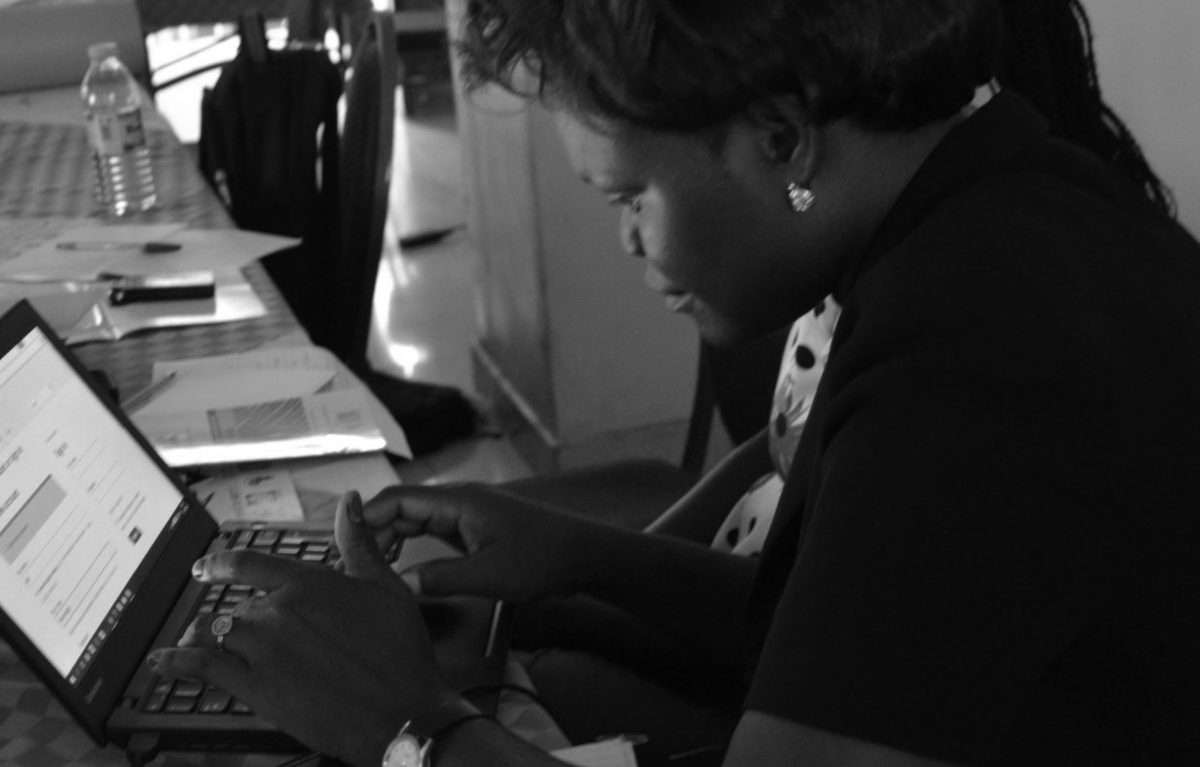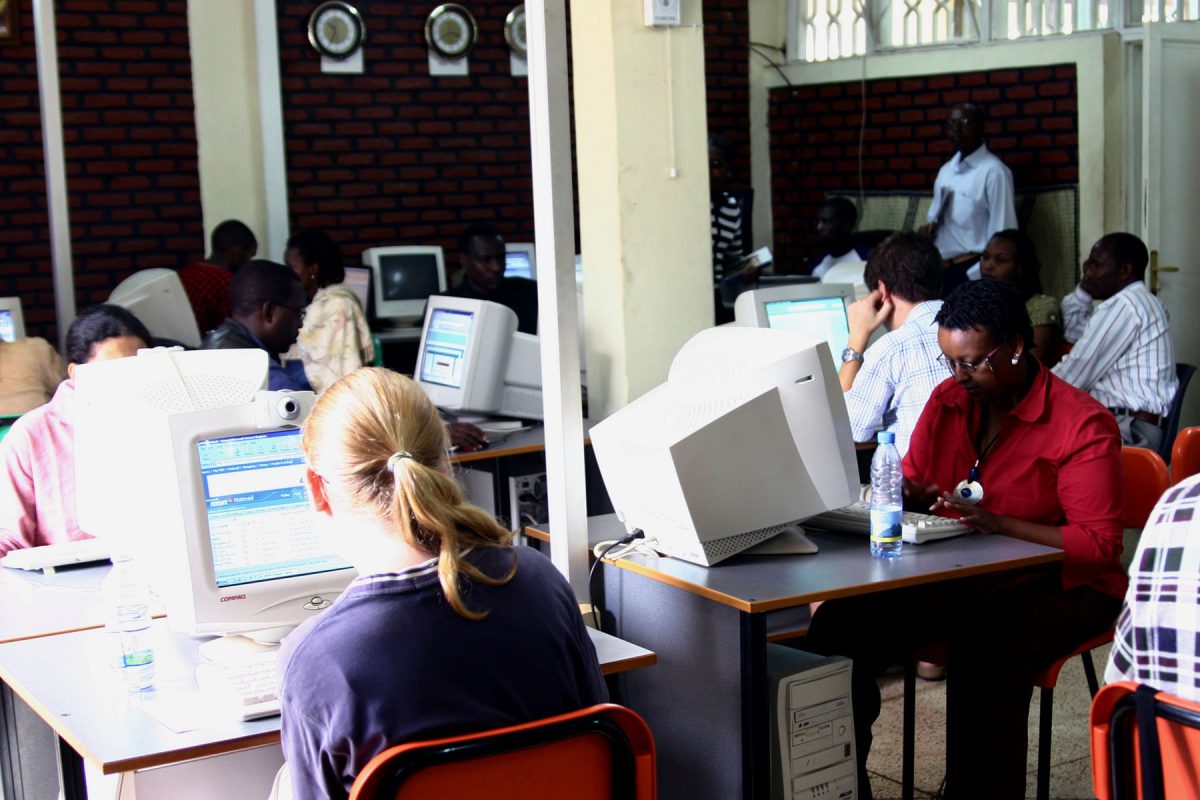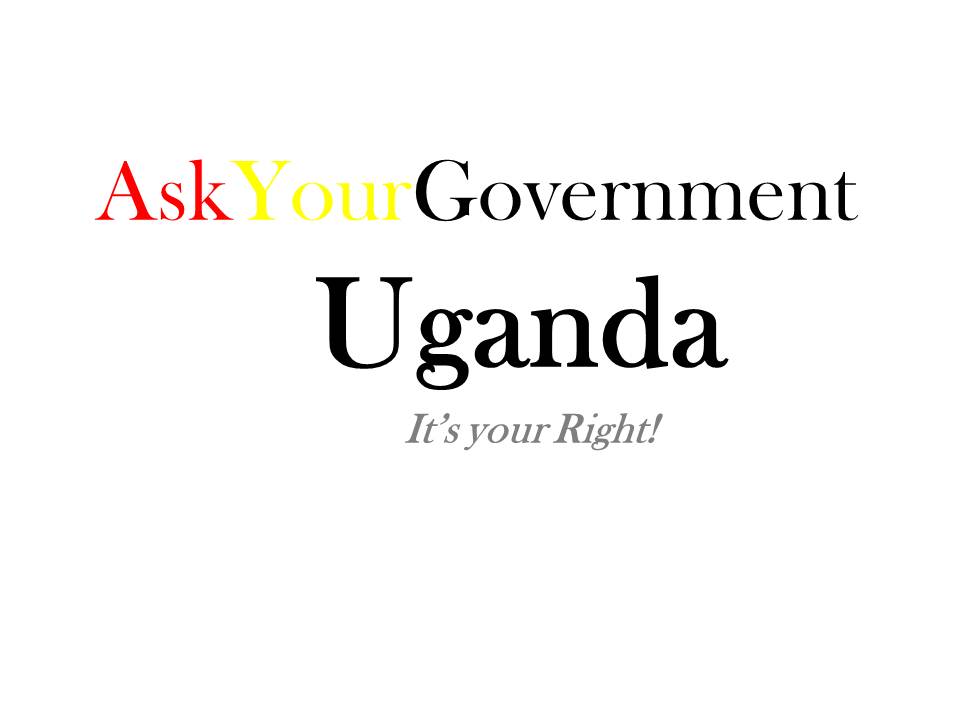By Moses Odokonyero |
Local government officials from the northern Uganda districts of Gulu, Amuru and Nwoya were recently trained in the use of the online freedom of information portal Ask Your Government (AYG). The officials have said the platform, which is accessed at www.askyourgov.ug, will be useful in improving the flow and exchange of information between their districts and the public. The training organised by the Collaboration on International ICT Policy for East and Southern Africa (CIPESA) in partnership with Northern Uganda Media Club (NUMEC) and was held August 31 in Gulu, Uganda. Participants at the training included Information Officers, Community Development Officers, Natural Resources Officers and an Assistant Chief Administrative Officer from the administrations of the three districts in the Acholi sub region.
The training aimed to promote the release of public information held by the state through the use of online tools but with a specific focus on the AYG portal. The portal was launched in 2014 by the Uganda Office of the Prime Minister in partnership with the Africa Freedom Information Centre (AFIC) and CIPESA and is aimed at supporting the Access to Information Act (2005) by enabling citizens to request and receive public information from government authorities.
“I was unaware of the website before the training. But I now know how to use it. I think it will be useful in the sharing of information between us in the local governments and the public,” said Anthony Onen, the Amuru District Population Officer. He added, “But we need more of our colleagues in other departments also trained on how to use the website … because these departments hold information that is important for the public.’’
Meanwhile, Santa Odwa, an Assistant Chief Administrative Officer (CAO) with the Gulu district local government, remarked: “The training on how to use this website will help improve sharing of information with the public but the public must also be sensitised on how to use it and what kind of information can be asked for and not asked for from us.”
The district officials were also taken through different laws in Uganda that govern citizens right to access information, particularly the Access to Information Act, 2005. The Act aims, among others, to promote transparency and accountability in organs of the state by providing the public with information, and to empower the public to scrutinise and participate in government decisions that affect them.
In the context of northern Uganda, transparency and accountability by public authorities and the involvement of the public in the scrutiny of the public organs is particularly important. In the last decade, the region has seen several post-conflict recovery projects funded by both the government of Uganda and donors aimed at rehabilitating the region following years of conflict. Most of these projects have been implemented under the framework of the Peace, Recovery, and Development Programme (PRDP).
Due to a lack of public scrutiny and limited information available to the public about projects under the PRDP, substandard work and corruption impeded delivery of public services under PRDP. In 2012, the Auditor General uncovered the swindling of over 50 billion shillings (US$14.7 million) by officials, which may have been exacerbated by a lack of transparency in the operations of the programme.
In September, 2016, the government launched a UGX 233 billion (US$68.5 million) —Project Restoration of Livelihoods in Northern Uganda (PRELNOR). The seven-year project aims to improve livelihoods and construct community roads to link local communities in nine districts in the Acholi region to markets. This type of project underscores the continued need for the public to have access to information to empower them so they are in position to hold public organs and officials accountable.
According to the communications regulator, as of March 2016, there were approximately 21 million mobile phone subscriptions while 38.9% of Ugandans had access to the internet. These figures pose a great opportunity for citizens to find innovative ways to shape democratic governance, including to monitor government transparency. The AYG portal and other online platforms are increasingly gaining influence and becoming important channels to disseminate information, promote accountability and cause public debate around public service delivery issues in Uganda.
The training is part of activities by CIPESA, NUMEC and local partner radio stations to promote the right to information as a catalyst for service delivery monitoring in northern Uganda and in supported by the Indigo Trust.
Here's What CIPESA is Up To in 2015
ICT4Democracy in East Africa Network: With funding from the Swedish International Development Cooperation Agency (Sida), CIPESA is coordinating this project, which includes sub-granting to the following partners: the Commission for Human Rights and Good Governance (Tanzania), iHub Research (Kenya), the Kenya Human Rights Commission, Women of Uganda Network, Toro Development Network, and Transparency International Uganda. The Network uses ICT to promote citizen participation in democratic processes, human rights monitoring and social accountability.
OpenNet Africa: This project continues from 2012 and has support from the Humanist Institute for Cooperation with Developing Countries (Hivos) and the Open Technology Fund. Activities include an examination of the threats to access, privacy and security online in Burundi, Ethiopia, Kenya, Rwanda, Tanzania, and Uganda. We are documenting internet rights violations on an ongoing basis and maintaining the www.opennetafrica.org portal as the one-stop resource on internet freedoms in Africa. We are training human rights defenders, journalists, bloggers, artists and minority groups on internet freedoms, privacy and security online; as well as testing and promoting the use of tools that enable anonymising users’ identities, secure communications and the circumvention of online censorship.
Leveraging Open Data and the Right to Information to Promote Service Delivery: The purpose of the project is to empower citizens in East Africa to use Right to Information (RTI) laws and constitutional guarantees in combination with ICT to lodge information requests from public bodies. The project also involves awareness-raising and network building activities to promote RTI in Kenya, Uganda and Tanzania. The work is supported by the Open Society Foundations.
iParticipate Uganda: This project has been ongoing since 2011 and is currently supported by Sida. Activities include training of media and civil society in the use of ICT to promote citizen participation in democratic processes; research and promoting awareness on the utility of ICT for promoting citizen participation in democratic and public accountability processes. The activities also include provision of support to grassroots public ICT access centres; and engaging policy makers and other influencers on enabling ICT related policies to support democratisation and free expression.
Local Actions to Secure Internet Rights: This project specifically focuses on promoting individual’ privacy and personal data online. Using the current drafting process of the Uganda Data Protection and Privacy Bill 2014, we are building advocacy work towards the adoption of a progressive legislation that protects individuals’ data and privacy in the digital era. The country has a number of laws that undermine the rights to freedom of expression, data protection, privacy and access to information. These include: the Anti-Pornography Act 2014, The Regulations on Interceptions on Communications 2010, Anti-Terrorism Act 2002, Official Secrets Act 1964, and the Computer Misuse Act 2011. The Ford Foundation is supporting this work through the Association for Progressive Communications (APC).
Uganda Launches Portal to Support Citizens’ Right to Information
14 August 2014
Press Statement
For immediate release
Uganda Launches Portal to Support Citizens’ Right to Information
The Office of the Prime Minister (OPM) through the Ministry of Information and National Guidance today launched the Ask Your Government (AYG) online platform (www.askyourgov.ug) at the Imperial Royale Hotel, Kampala. AYG is an initiative of the OPM in partnership with the Collaboration on International ICT Policy in East and Southern Africa (CIPESA) and the Africa Freedom of Information Centre (AFIC). It is aimed at promoting Ugandan citizens’ right to information in support of transparency, accountability and good governance.
Uganda was amongst the first African countries to adopt Right to Information (RTI) legislation with the passing of the Access to Information Act of 2005. The AYG portal allows citizens to directly send requests for information to information officers in Government departments, ministries and agencies. Responses to the information requests are relayed directly to the email address of the person who makes the requests and are also publicly displayed on the portal.
While Uganda currently has an internet reach of 20% of the population, this initiative will work alongside civil society organisations to ensure that digitally under-represented citizens including people living in rural areas and women can make information requests through the platform. Its wider target audience also includes general citizens with targeted efforts geared at journalists, researchers, university lecturers, and students.
The launch was officiated by Hon. Rose Namayanja Nsereko, Minister of Information and National Guidance who highlighted the changes that government has undertaken in improving information availability within government and amongst Ugandan citizens. She noted, “The tool avails to Ugandans an opportunity to access public information. We as government can also use the platform when planning by identifying the types of information that citizens most request.” She also added that the platform will increase public scrutiny of the Ugandan government and enhance transparency and accountability to citizens.
In his opening remarks, Simon Mayende, Director at the Ministry of Information and National Guidance (MING) in the OPM stressed the commitment of the Ministry towards “ensuring that the public access information held by all public bodies.” He added that“there should be no barriers of this right of citizens.” The launch was attended by media as well as information officers from various government offices who will be the key drivers of the success of the platform. Also present were members of civil society organisations and development partners.
Activities at the launch included a round table discussion. Panellists included Moses Watasa, Commissioner with the OPM/MING and representatives of civil society organisations including Gilbert Sendugwa (AFIC), Wairagala Wakabi (CIPESA), Patrick Tumwine (Human Rights Network), Jude Odaro (Uganda Debt Network) and MareikeLe Pelley (Friedrich-Ebert-Stiftung).
Discussions explored topics such as Ugandan citizens’ rights to information as per the Access to Information Act, 2005 and accountability. It also explored the integral role that Information Communication Technologies (ICTs) play in promoting engagement between government, civil society and ordinary citizens.
Mr.Odaro commended the Government for building an elaborate legal and institutional framework to facilitate access to public information by citizens as a critical aspect of development. “This in the long run will help citizens understand government development priorities and plans while enhancing awareness and ownership of development initiatives,” he said. He also stressed the work that has to go into sensitising government officials for increased commitment towards right to information.
Mr.Wakabi stated that the increased proliferation of ICTs in the country provided immense opportunities for government to operrationalise existing legal frameworks and improve social accountability. Indeed, Mr.Watesa pointed out that the AYG website was an important tool in government’s efforts to improve communication with citizens – an area that government hasn’t been doing very well in.
Discussions were followed by the unveiling of the website through a demonstration in which a query on the ministerial policy statement for the Office of the Prime Minister for the year 2014/2015 was requested.
The live demonstration highlighted the simplicity of registering an account and making a direct request to government for swift responses while at the same time creating a library of queries and responses that can be accessed by other visitors to the website who may have similar questions.
A user guide was distributed amongst all those present to help them navigate through the processes of requesting and responding to information queries.
The website launch marks the commitment that government has towards making public information easily accessible to the citizens of Uganda while also providing an effective, cheaper and less time consuming solution to requesting information from the country’s public bodies.
Ask your Government is available on social media:
Facebook page: https://www.facebook.com/askyourgovug
Twitter @AskYourGovUg
For further information please contact
https://www.facebook.com/askyourgovug
Twitter: @AskYourGovUg
Hashtag: #AYGUganda
Email: [email protected]
| Ministry of Information and National Guidance – Office of the Prime Minister (OPM)Plot 9-11 Apollo Kaggawa Road,
Kampala, Uganda Tel: +256 417770500 |
Collaboration on International ICT Policy in East and Southern Africa (CIPESA)Plot 156-158 Mutesa II Road, Ntinda Kampala, Uganda Tel:+256 414 289 502 |
Africa Freedom of Information Centre (AFIC)Plot 5 Katego Road, Kamwokya
Kampala, Uganda Tel: +256 414 533554 |
CIPESA 2014 Projects
ICT4Democracy– iParticipate Uganda. This project has support from Spider to October 2014 and from Sida to December 2014. Activities will include documenting and publicising the benefits of open governance to citizens and the media; training of media and civil society in the use of ICT tools to promote citizen participation; provision of support to grassroots public access centres; policy analysis on Kenya, Tanzania and Uganda; research on ICTs and governance; and research dissemination.
Coordination of the ICT4Democracy in East Africa Network. With funding from Sida (January 2014-December 2014), CIPESA will manage this project which involves the disbursement of funds for the activities of the following partners: the Commission for Human Rights and Good Governance (Tanzania), iHub Research (Kenya), the Kenya Human Rights Commission, Women of Uganda Network, Toro Development Network, Transparency International Uganda, and CIPESA.
Promoting internet freedoms: This project continues from 2013. It has support from Hivos (January and February 2014), and from the University of Toronto (January 2014-October 2014). Activities will include finalising research on internet freedoms policies and practices in Burundi, Ethiopia, Kenya, Rwanda, South Africa, Tanzania, and Uganda; documenting internet rights violations and maintenance of the www.opennetafrica.org portal as the one-stop resource on online freedoms in Africa.
Leveraging Open Data and the Right to Information to Promote Service Delivery: The purpose of the project is to empower citizens in East Africa to use the RTI law to lodge requests and document their experiences through the use of Information and Communication Technologies (ICTs). The project also aims to undertake awareness-raising and network building activities to promote the right to information in Kenya, Uganda and Tanzania. The work is supported by the Open Society Institute from January 2014 to December 2014.



